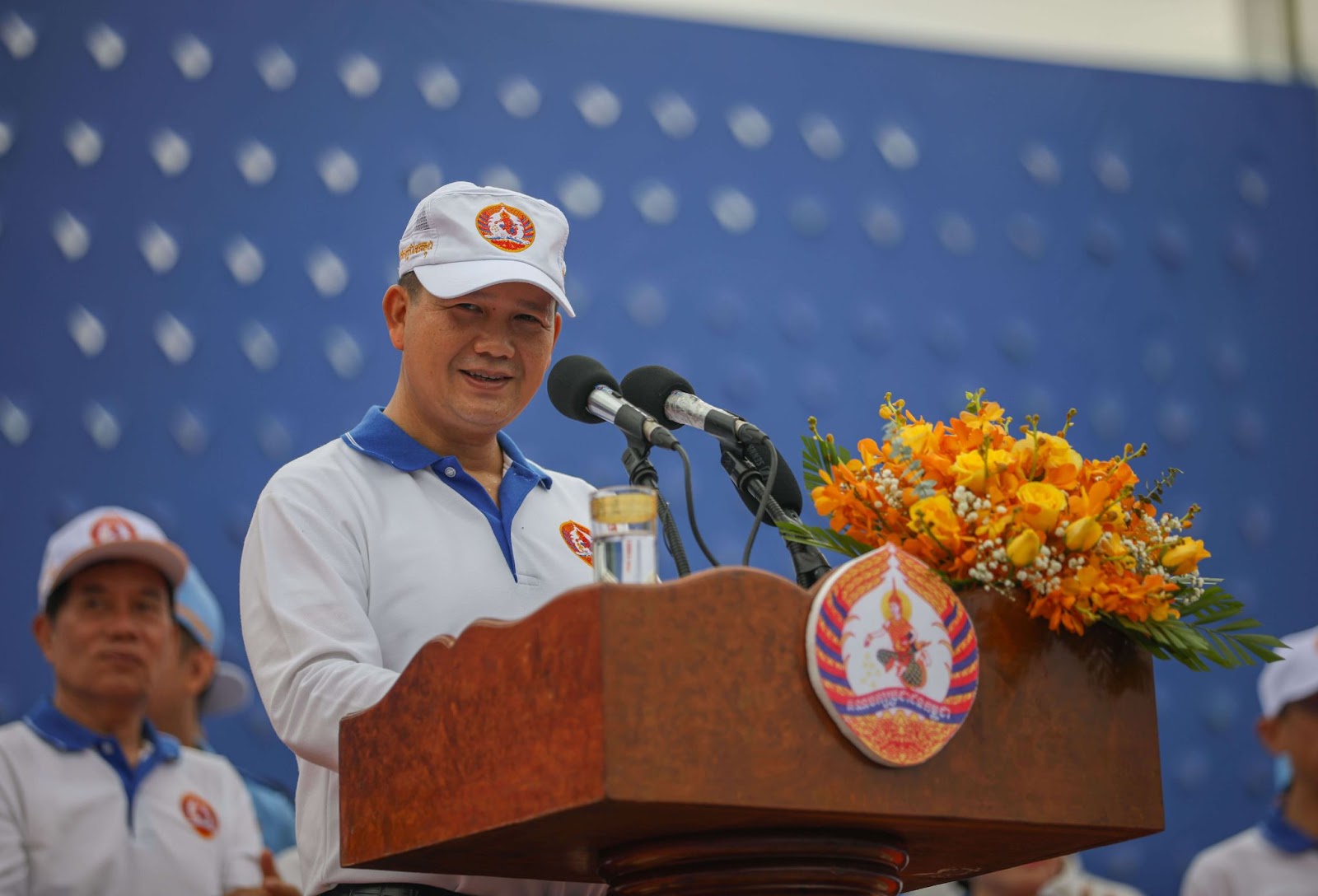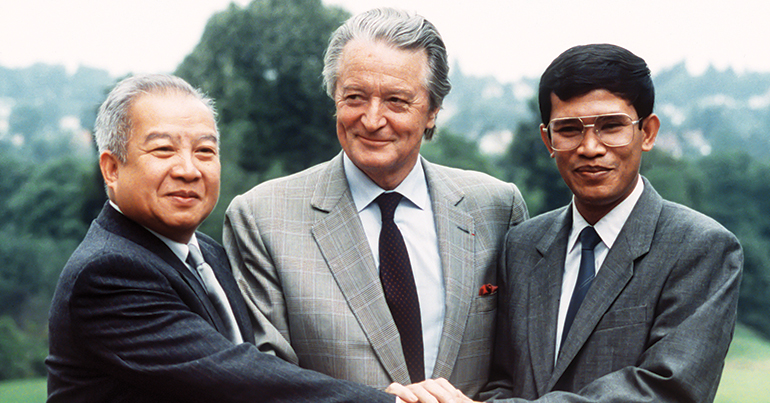After nearly four decades in power, Cambodia’s Prime Minister Hun Sen has put in his resignation notice.
Just two days after Cambodians cast their ballots in a general election dominated by his party and condemned by the West as neither free nor fair, the long-standing leader announced on state television that he would pass his office to his eldest son, Hun Manet, on 22 August.
Hun Sen will remain the head of the ruling Cambodian People’s Party (CPP) and will stay in the new government as president of the Senate, a posting he’ll take in February.
“It is the country’s plan to maintain long-term stability – such stability and peace is the foundation of development,” the prime minister said in the nearly hour-long televised address. “It is an assurance that when a new generation takes power, the old generation stands beside him.”
The CPP has long managed to keep its inner workings opaque, and though rumours of rifts still occasionally swirl beyond its ranks, the party today generally presents a united public face. After Hun Sen publicly announced in December 2021 his wish to hand power to his son, within nearly a week top party leaders – along with authorities from officially nonpartisan institutions such as the judiciary and military – had rushed to endorse Manet as a future prime minister candidate, swallowing whatever ambitions or reservations they may have had.
“I am the one who makes the biggest sacrifice.”
Prime Minister Hun Sen
From there, last weekend’s ballot represents not only the image of a people’s mandate for dynastic rule, but also a means of cementing a son’s inheritance – a system of near-total state power largely accountable only to itself and tightly consolidated around a single family and its patriarch.
The breakdown of the party’s historic factions to make way for such a personalised model of rule has been decades in the making by its architect Hun Sen, an ex-soldier who backed his will to power with a battlefield view toward governance.
Through years of careful brokering, the prime minister has knit a tightly woven ruling elite using a mix of patronage politics and outright violence waged on a scale both petty and grand. In the past five years alone, the prime minister has made dramatic gains in societal control after the Supreme Court, led by a top member of the CPP, ordered the dissolution of the popular opposition Cambodian National Rescue Party (CNRP) ahead of the previous national elections of 2018. That ruling gave way to the mass trials of former CNRP members and supporters for crimes ranging from incitement to treason.
After his son takes the top office, Hun Sen will undoubtedly keep an unwavering eye on the careful balance of interests that have made possible his vision of rule. Even with his father’s continued influence, Manet may find the weight of this amassed power to be a heavy burden to shoulder.
“I am the one who makes the biggest sacrifice,” Hun Sen told Chinese state media before the election. “Right now, I have an absolute power, but in about a month, I won’t have the power to sign any bills the same way as I do today.”

Over the past year, Manet, a military commander, has represented the state in various functions both domestically and abroad. Last week, he headlined the CPP’s closing rally of the official campaign period, speaking to party supporters before leading a massive motorcade through the capital Phnom Penh.
Despite its nearly exclusive historic control of all state mechanisms, the ruling party still handled Sunday’s national election as a critical juncture of a larger generational turnover within the CPP characterised in large part by nepotistic power transfers.
In May, the National Election Committee rejected the country’s most popular political opposition – the Candlelight Party, a reconstituted version of the CNRP – over an alleged paperwork issue. With no serious opposition, the ruling party declared a “landslide” victory, claiming 120 of the 125 seats in the National Assembly. An analysis of the candidate list by the media outlet CamboJA found that 22.4% of CPP candidates are familial relatives.
The remaining five seats will go to Funcinpec, a royalist party. The organisation has deep roots – it won Cambodia’s UN-administered election of 1993, defeating the CPP, but was later toppled in a brutal 1997 clash orchestrated by Hun Sen.
That first modern election served as the capstone of the unprecedented scope of the UN Transitional Authority of Cambodia, which ostensibly provided a framework to end the country’s long-boiling conflict with a shift to liberal democracy.
By the time the UN rolled in with more than 20,000 personnel and $1.6 billion in eventual spending, Hun Sen had already been prime minister of a single-party state since 1985.
A former Khmer Rouge cadre who defected early to Vietnam, he’d returned home in the 1979 Vietnamese invasion that swiftly crushed the communist government of Democratic Kampuchea and established a new, socialist government. Hun Sen rose through the ranks in Phnom Penh under Vietnam’s decade-long occupation and, upon its military withdrawal, took over the fight against the remaining Khmer Rouge insurgency.
Before the elections of 1993, geopolitical wrangling had left his government unrecognised by the international community. Cambodia’s seat at the UN was filled by a representative of a tripartite government-in-exile that included royalists, the Khmer Rouge and anti-communist Khmer nationalists avowed to end the Vietnamese occupation.
This unlikely alliance was led by the late King Norodom Sihanouk, a deeply influential figure of modern Cambodian history who lent his legitimacy to its cause.

The years of international isolation had already chafed Hun Sen. So by 1993, when the royalist victory at the polls threatened to sideline the embattled prime minister, he promptly forced a power-sharing agreement that all but undid the results of the ballot. Hun Sen and Funcinpec party leader Prince Norodom Ranariddh, son of the former king, ruled as co-prime-ministers until the clash of 1997 put a decisive end to that.
In a recollection of the 1997 conflict published after its 10-year-anniversary, former UN rights worker Brad Adams described the short-lived fighting between the armed wings of the CPP and Funcinpec.
“Even without the support of much of his party, Hun Sen was able to put together enough military power to succeed,” wrote Adams, who was by then the Asia director of Human Rights Watch. “He then unleashed his forces to carry out a campaign of extrajudicial executions, primarily of FUNCINPEC military officers. I and many of my colleagues at the UN human rights office had the unforgettable experience of digging up the bodies of men stripped naked to their underwear, handcuffed behind their backs, blindfolded, and shot in the head.”
To the victor go the spoils.”
Brad Adams, former Human Rights Watch Asia director
Speaking to the Globe shortly before the election, Adams believed the 1997 conflict was the key turning point for the eventual consolidation of Hun Sen’s power over both party and country. Though rival factions within the CPP may have once posed a real threat to his leadership, his triumph over Funcinpec and his co-prime-minister Ranariddh – who died in 2021, passing Funcinpec’s leadership to his own son, Prince Norodom Chakravuth – secured his status at the top.
“To the victor go the spoils,” Adams said. “He basically took control of the police, the military and the gendarmerie after the coup, and he hasn’t looked back.”
Though armed conflict akin to that in 1997 has yet to resurface in Cambodia, a steady current of unresolved street attacks on opposition members ahead of this year’s election managed to keep the old militaristic spirit alive. Still, in comparison with Funcinpec’s earlier beheading and the legalistic blitzkrieg unleashed against the CNRP, this year’s rejection of Candlelight was practically hushed.
“There’s never been a time when there haven’t been laws in the books that could be used this way, so the lawfare succeeded there as a result of years and years of violence and intimidation,” Adams said. “People have made a calculation this time around that the cost-benefit of publicly opposing this is not great because there’s almost no chance of a benefit.”
Within this mathematics of power, Manet is an untested variable. In a political system where blood ties are the ultimate bond, it remains to be seen exactly how much of his father’s legacy he will inherit.


